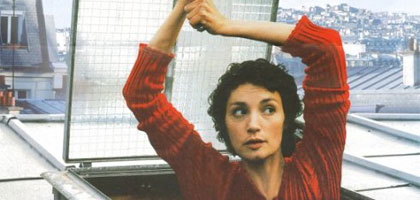
The Old Stager
Film of the Month: Va savoir

Does Rivette's latest film herald a New Wave revival, asks Ginette Vincendeau.
Revisiting the territory of his first feature Paris nous appartient (1961) and several of his other films since - especially L'Amour fou (1968) and L'Amour par terre (1984) - Jacques Rivette fashions his latest movie as a 'film about the theatre' with a classic play-within-a-play narrative structure. The film revolves around an Italian-language production of Luigi Pirandello's As You Desire Me, in which the central couple Camille and Ugo act for a week's run in Paris. From the beginning we know that the developments on stage will echo those in the 'real life' of the characters (and vice-versa); tellingly, the film starts and ends on stage.
Va savoir! unfolds over a leisurely 154 minutes (a restrained length by Rivette standards), intercutting performances on stage with events backstage and with scenes of the characters out and about in the city. It shares with As You Desire Me a Pirandellian interest in identity and memory, truth and lies and shifting points of view. (With its three couples, the film also recalls Pirandello's Six Characters in Search of an Author.) But for former film critic Rivette (who took part in a famous 1957 Cahiers du cinéma debate entitled 'Six characters in search of auteurs'), references to the cinema are never far behind, most evidently to Jean Renoir's The Golden Coach (La Carrozza d'oro, 1952), in which Anna Magnani led a group of commedia dell'arte players.
Camille, played by Jeanne Balibar, is in Paris for the first time in three years, since she broke up with philosophy lecturer Pierre. Thus like the play's heroine, she is ambivalently poised between present and past lovers. But the links between the characters are far more complex than this classic triangle would suggest. Pierre is now with Sonia (a ballet teacher), and while he tries to reclaim Camille's love, going as far as locking her in his flat, Sonia is seeing Arthur, the shady brother of the beautiful art student Dominique ('Do') to whom Ugo is attracted. As if this was not enough, it's hinted that the bond between siblings Do and Arthur is incestuous, and Camille sleeps with Arthur, thus having relationships with all three men. Rivette and his actors clearly delight in the game of improbable coincidences and pointed contrivances. At one point Ugo is led to Do's library by a historian played by Claude Berri - a mischievous cameo since he is a director (and producer) who represents the antithesis of Rivette's cinema.
Rivette manages the complex choreography of his characters with virtuoso comic timing, unsurprisingly since mystery and pretence have always been central to his cinema. As in his most famous film Céline et Julie vont en bateau (1974), self-conscious play-acting is the source of much pleasure and humour. For instance, Camille's night of love with Arthur, calculated to recoup the ring he stole from Sonia, is a brilliantly executed piece of mise en scène by Camille as woman and actress; and her retrieval of the ring from a flour jar is shot through with the playfulness - for which Balibar's impish features are ideally suited - that characterises Céline and Julie's games. The same could be said of the drinking 'duel' between Ugo and Pierre, of Pierre locking up Camille (and her escape over the roofs of Paris), and of the disastrous dinner party Sonia hosts. This is all light-hearted, charming and very French, even if there are some serious underlying points about deception being inherent to love and relationships.
The real seriousness of Va savoir, however, belongs to the cinema. Always one of the most formally radical directors of the New Wave, Rivette was also one of its most ardent defenders of art for art's sake, of cinema as a reflection on itself, through theatre. Speaking of Paris nous appartient in a 1968 interview, he said: 'All films are about the theatre... because that is the subject of truth and lies, and there is no other in the cinema.' Theatre entails performance, and Rivette is well known for giving his actors, and especially his actresses, an unusual degree of freedom. Va savoir certainly confirms Balibar as one of French art cinema's rising stars. In this context, it may seem begrudging to point out that the undoubted dominance of Va savoir's radiant actresses - Balibar, Marianne Basler as Sonia and Hélène de Fougerolles as Do - over the talented but less exciting men (Jacques Bonnaffé as Pierre and Sergio Castellitto as Ugo) disguises conventional gender stereotyping: the men are associated with high culture (Goldoni, Heidegger), the women with art (ballet, acting) or cooking (through Do's mother, a Renoiresque cameo from Catherine Rouvel). While Ugo directs and manages, Camille performs and has tantrums, while he searches, Do helps; while Pierre discusses philosophy, Sonia shifts furniture according to feng shui. Some things never change.
After his experimentation with cinema and painting (La Belle Noiseuse, 1991) and historical film (Jeanne la pucelle, 1994), Rivette returns with Va savoir not just to the theatre but to a classic New Wave idiom. As in his films from the 60s, we are seduced by the elegance and cleverness of the film-making, by witty dialogue in gorgeous Parisian interiors, by couples strolling down leafy boulevards and along the banks of the Seine. There is a sense of déjà vu, to be sure, but it is far from unpleasant. With new releases by Godard, Rohmer, Chabrol and now Rivette, 2001-02 is a great year for a late New Wave flowering.
